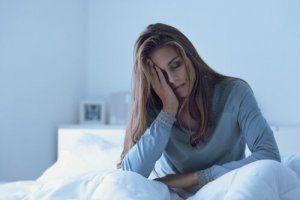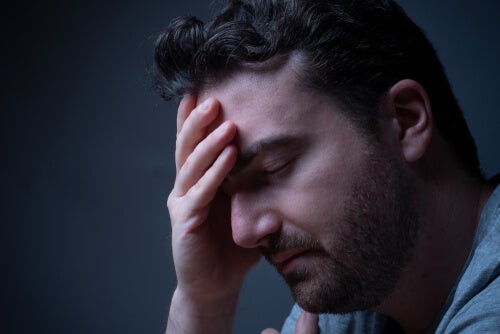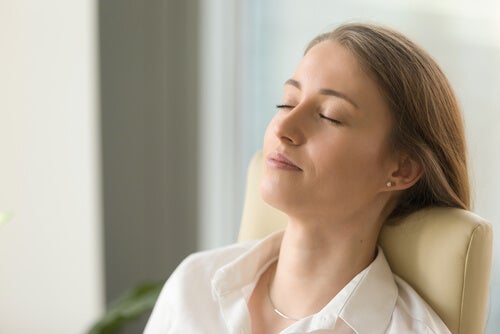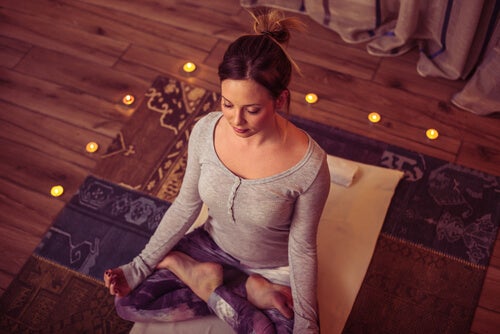Sleep Problems During the COVID-19 Crisis


Written and verified by the psychologist Valeria Sabater
One effect of the current coronavirus pandemic is an increase in sleep problems. Many people are having difficulty either falling asleep or being able to get a good night’s sleep without suddenly waking up feeling anxious. This is yet another consequence related to the pandemic.
You need to realize that getting good sleep is as essential as eating a balanced diet. Moreover, insomnia that lasts for weeks will end up weakening your immune system, and this can make you more vulnerable to the coronavirus. Also, if you’ve had previous illnesses, then getting poor sleep can make things worse.
Our lifestyle has changed. We’ve lost the routines that used to guide our days. This change in habits can also affect sleep in one way or another. Thus, in addition to the obvious concern, you’ll be adding further factors that can interfere with your seven or eight hours of uninterrupted sleep.
Because of this, you’re obliged to introduce small changes and appropriate strategies in order to care for this area of your life. In addition to maintaining good hand hygiene, it’s vital that you take care of your sleep hygiene. Let’s see how.

Sleep problems in periods of worry and crisis
Sleep problems during these days of uncertainty, quarantine, and anxiety manifest themselves in several different ways. People show particular symptoms that don’t always affect their sleep. These are the following:
- Some people suffer from bruxism. This can be classic tooth grinding or, on the contrary, clenching their jaws so tightly that they wake up with a headache the following day.
- Other people go to bed with an overactive mind. They lie awake thinking, worrying, imagining what tomorrow may bring, and anticipating all sorts of negative scenarios. All of that mental overexertion makes it very difficult for them to fall asleep.
- On the other hand, other effects may appear. One of them is to wake up suddenly in the middle of the night, possibly with tachycardia or sweating.
- Nightmares are another common characteristic.
- You may find it more difficult to get REM sleep, which is when the brain and body are truly refreshed. This light sleep makes you feel as if you haven’t had any rest at all. Because of this, you’ll probably experience fatigue or concentration problems.
As we pointed out at the beginning, poor sleep can weaken your immune system. Your anxiety and stress will increase as a result.
If your body is tired and your mind saturated, then your emotional vulnerability will increase and your ability to react will decrease. Your whole ability to cope with situations will be severely affected.

Keys to improving sleep during the COVID-19 crisis
When it comes to sleep problems during the current crisis, you need to understand one important factor. Not all suggestions will work the same for everyone. It’s essentially a matter of trying to make small changes in your daily life to discover what works best for you.
Having a clear routine
The confinement you’re experiencing altered your routines. Therefore, you’ll need time to define new ones to get your body and mind used to them. This implies that you’ll need to be disciplined when going to bed and when getting up. You’ll need to try to keep to the same hours if possible.
Beware of infoxication
One of the biggest sources of stress and anxiety is the excess information we’re being bombarded with, with all the latest figures of infected people and deaths.
Try to reduce the time you spend watching the news. Yes, you need to keep yourself informed, but don’t get obsessed. If you do, this increases the chances that you’ll worry excessively and suffer from insomnia.
Turn off your devices one hour before bedtime
You’ve probably gotten used to spending your free time watching TV shows and movies on different digital platforms. Yes, this is obviously a good way to entertain yourself. However, if you have trouble falling asleep, then you’ll need to turn off your devices at least one hour before bed to avoid your exposure to blue light.
Remember that the waves that these devices emit can overstimulate the brain and make it difficult to get a good night’s sleep.
After dinner, let positive emotions flow
It’s important for you to try to maintain positive emotions and a good mood in the evenings. A good idea is to call your friends or family and have a good time talking about everything under the sun, remembering the good times, and making plans for when all of this is over.
Also, it’s a good idea to do activities that you really enjoy, such as playing a game with your family, listening to music, getting into a good book, or taking a relaxing bath. The important thing is to go to bed with a peaceful mind and avoid getting suffocated with thoughts about COVID-19.

Try meditation
It’s true that you’ll need several weeks to truly reap the benefits of meditation. However, now would be a good time to get into it. It’ll help you to:
- Relax your body.
- Calm your mind.
- Take control of your emotions and thoughts.
- Focus on the here and now.
It’s worth giving it a try to discover its benefits.
To conclude, if you’re starting to have trouble sleeping due to the current situation, apply these strategies. Your health depends on it!
One effect of the current coronavirus pandemic is an increase in sleep problems. Many people are having difficulty either falling asleep or being able to get a good night’s sleep without suddenly waking up feeling anxious. This is yet another consequence related to the pandemic.
You need to realize that getting good sleep is as essential as eating a balanced diet. Moreover, insomnia that lasts for weeks will end up weakening your immune system, and this can make you more vulnerable to the coronavirus. Also, if you’ve had previous illnesses, then getting poor sleep can make things worse.
Our lifestyle has changed. We’ve lost the routines that used to guide our days. This change in habits can also affect sleep in one way or another. Thus, in addition to the obvious concern, you’ll be adding further factors that can interfere with your seven or eight hours of uninterrupted sleep.
Because of this, you’re obliged to introduce small changes and appropriate strategies in order to care for this area of your life. In addition to maintaining good hand hygiene, it’s vital that you take care of your sleep hygiene. Let’s see how.

Sleep problems in periods of worry and crisis
Sleep problems during these days of uncertainty, quarantine, and anxiety manifest themselves in several different ways. People show particular symptoms that don’t always affect their sleep. These are the following:
- Some people suffer from bruxism. This can be classic tooth grinding or, on the contrary, clenching their jaws so tightly that they wake up with a headache the following day.
- Other people go to bed with an overactive mind. They lie awake thinking, worrying, imagining what tomorrow may bring, and anticipating all sorts of negative scenarios. All of that mental overexertion makes it very difficult for them to fall asleep.
- On the other hand, other effects may appear. One of them is to wake up suddenly in the middle of the night, possibly with tachycardia or sweating.
- Nightmares are another common characteristic.
- You may find it more difficult to get REM sleep, which is when the brain and body are truly refreshed. This light sleep makes you feel as if you haven’t had any rest at all. Because of this, you’ll probably experience fatigue or concentration problems.
As we pointed out at the beginning, poor sleep can weaken your immune system. Your anxiety and stress will increase as a result.
If your body is tired and your mind saturated, then your emotional vulnerability will increase and your ability to react will decrease. Your whole ability to cope with situations will be severely affected.

Keys to improving sleep during the COVID-19 crisis
When it comes to sleep problems during the current crisis, you need to understand one important factor. Not all suggestions will work the same for everyone. It’s essentially a matter of trying to make small changes in your daily life to discover what works best for you.
Having a clear routine
The confinement you’re experiencing altered your routines. Therefore, you’ll need time to define new ones to get your body and mind used to them. This implies that you’ll need to be disciplined when going to bed and when getting up. You’ll need to try to keep to the same hours if possible.
Beware of infoxication
One of the biggest sources of stress and anxiety is the excess information we’re being bombarded with, with all the latest figures of infected people and deaths.
Try to reduce the time you spend watching the news. Yes, you need to keep yourself informed, but don’t get obsessed. If you do, this increases the chances that you’ll worry excessively and suffer from insomnia.
Turn off your devices one hour before bedtime
You’ve probably gotten used to spending your free time watching TV shows and movies on different digital platforms. Yes, this is obviously a good way to entertain yourself. However, if you have trouble falling asleep, then you’ll need to turn off your devices at least one hour before bed to avoid your exposure to blue light.
Remember that the waves that these devices emit can overstimulate the brain and make it difficult to get a good night’s sleep.
After dinner, let positive emotions flow
It’s important for you to try to maintain positive emotions and a good mood in the evenings. A good idea is to call your friends or family and have a good time talking about everything under the sun, remembering the good times, and making plans for when all of this is over.
Also, it’s a good idea to do activities that you really enjoy, such as playing a game with your family, listening to music, getting into a good book, or taking a relaxing bath. The important thing is to go to bed with a peaceful mind and avoid getting suffocated with thoughts about COVID-19.

Try meditation
It’s true that you’ll need several weeks to truly reap the benefits of meditation. However, now would be a good time to get into it. It’ll help you to:
- Relax your body.
- Calm your mind.
- Take control of your emotions and thoughts.
- Focus on the here and now.
It’s worth giving it a try to discover its benefits.
To conclude, if you’re starting to have trouble sleeping due to the current situation, apply these strategies. Your health depends on it!
This text is provided for informational purposes only and does not replace consultation with a professional. If in doubt, consult your specialist.







